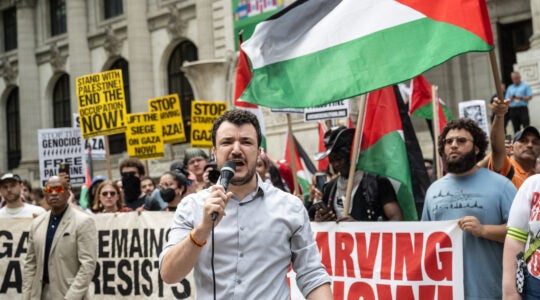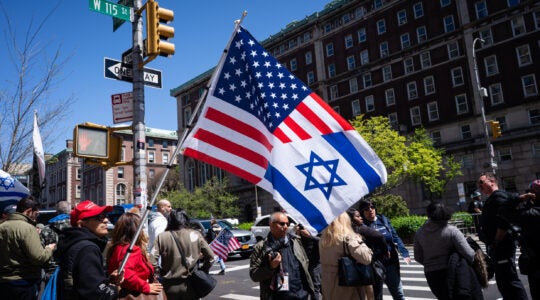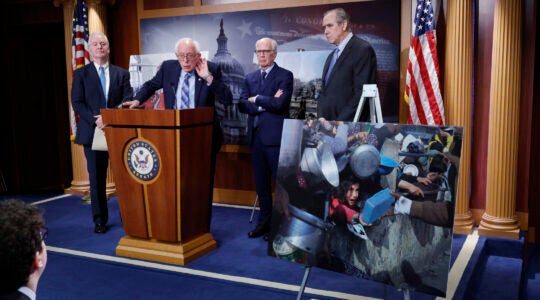TOLEDO, Ohio (j. weekly) — When I wrote an article nine years ago about going on a press trip to Israel, I was just beginning to explore the implications of my Arab-Jewish heritage on my life. The trip was eye opening for me in many ways, chiefly because it was the first time I openly confronted and then wrote about living with this dual ancestry.
Now I find myself again writing about the same subject, only under vastly different circumstances.
On Sept. 11, the 10-year anniversary of the 9/11 attacks, I was flying from Denver to Detroit. After we landed, I was handcuffed and pulled off the airplane with two Indian men for “suspicious activity.”
Following my 2002 Israel trip as a writer for the j., San Francisco’s Jewish newspaper, I wrote, “A co-worker who had lived in Israel said I should expect some harassment or strange looks” (because of my Arabic heritage). During the trip, I acutely felt the tension between the Arabs and Jews living there. It was during a peak in the second intifada, and our press trip was intended to show that tourism was still possible and attractive, though suicide bombings in public markets and on buses were common.
I was torn between empathizing with the plight of the Palestinians and feeling at home as well as solidarity with the Israelis. I marveled at the Israelis’ resilience to the violence but questioned how it appeared that the Arabs were second-class citizens. It was a powerful experience for me, and it sparked a trend of writing about my ancestral conflict.
On Sept. 11, I was returning from spending the weekend with my sister and her family in San Francisco. My flight had a layover in Denver before connecting me back to the Detroit airport. My husband, from Moraga, our two kids and I now live in a suburb of Toledo, Ohio, where my husband is doing a residency in emergency medicine.
I had been looking forward to an uneventful flight — albeit on an ominous day — and I wanted to get home to have dinner with my family. I was happy when our flight landed in Detroit on time. I sent a text message to my husband telling him I should be home in an hour. But I didn’t know that two F-16s had been following the plane to Detroit and what was waiting for us — especially my row mates and me — when we landed.
As I later recounted in a blog post, which I titled “Some real Shock and Awe: Racially profiled and cuffed in Detroit,” the events that unfolded shortly after our plane touched the ground turned an easy trip into a frightening ordeal: I was handcuffed and escorted by armed officers off the plane into a police car and placed in a holding cell.
I was later strip-searched and interviewed by FBI and Homeland Security agents about my actions and those of the two men in the seats next to me during the flight. They had detained the three of us for “suspicious behavior,” which media reports described as the two men going to the bathroom several times and remaining indisposed for long periods.
On the other hand, I did not move from my seat during the entire flight, yet was still pulled off and detained simply because — I can only imagine — I had been seated next to the two Indian men and I have a dark complexion.
The incident recalled memories of that 2002 press trip to Israel of how scared my family and I were that I would be blown up by a suicide bomber. We were all so relieved that I came back in one piece that we started a ritual feast that we celebrate on the summer solstice.
At Ben Gurion Airport, as I was preparing to fly home to San Francisco, airport security personnel started asking questions about some of the visas I had in my passport. One was from Saudi Arabia and another from Egypt — both of which I had received during a family trip in 1999. A female agent took my passport and disappeared for a while, maybe 15 minutes. When she returned, she gave me back my passport and sent me on my way.
That was the longest I had been “detained for questioning,” and I felt like the matter was dealt with appropriately. I understood the nature of their adherence to security protocol and suspicions about travel to Arab countries.
This Sept. 11 was a different story. My detainment and questioning in Detroit seemed so unfounded and unprovoked that I sat wondering where my rights had gone — or if I had any to begin with.
There is no mistaking that the 9/11 terrorist attacks were horrifying. I cannot begin to imagine the pain that those who experienced the events firsthand felt and probably continue to feel. As an American I was in shock, but I had no idea that we would still be fighting our same demons 10 years later.
This country has always been one of innovation, fortitude and pluck. I question if our lingering fears and over-the-top safety measures have dampened those strengths. Some will counter that our national security protocols and procedures are what keep us safe, but I can tell you that I would take a 15-minute investigation at the airport before I board a plane rather than an aggressive, unwarranted detention any day.
The public and media attention my blog post has received this week has been overwhelming, turning into something quite bigger than I could have ever imagined. To me it signals a dire need for a national debate on the way we are handling our national security.
I do hope that a positive outcome will come from this, and as a nation we can live less in fear and more in tolerance and acceptance.
(Shoshana Hebshi worked for j.-the Jewish news weekly of Northern California in 2002 and 2003 as a copy editor and writer. She now lives outside Toledo, Ohio, raising her twin boys and working on freelance projects. Contact her at Shoshana@shoshanahebshi.com or follow her on Twitter @ShoshanaHebshi.)
JTA has documented Jewish history in real-time for over a century. Keep our journalism strong by joining us in supporting independent, award-winning reporting.





